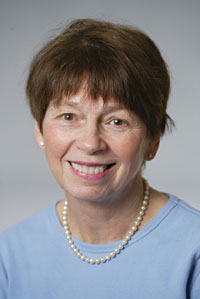Vital Signs
INVESTIGATOR INSIGHT
In this section, we highlight the human side of biomedical investigation, putting a few questions to a researcher at DMS-DHMC.

|
Constance Brinckerhoff, Ph.D. |
Constance Brinckerhoff, Ph.D.
Nathan Smith Professor of Medicine and of Biochemistry
Brinckerhoff joined the faculty in 1972; she is also associate dean for science education at DMS. Her research focuses on the degradation of connective tissue in arthritis and cancer.
If you weren't a scientist, what would you like to be?
I have no idea. It didn't occur to me to be anything else.
What famous scientist, either living or dead, would you most like to meet?
There are several actually. I wouldn't mind meeting Marie Curie, Louis Pasteur, or Robert Koch. Those were people who were pioneers in their time. I'd like to see what they had to say. Pasteur and Koch, for example, were involved with understanding the principles of infection, at a time when little was known compared with what we know today.
What's the last book that you read?
Seabiscuit. I loved it. I saw the movie twice and thought they did a great job with the movie, but I thought the book was just incredible.
What type of music do you enjoy?
Classical. The Trout Quintet by Schubert. I like some Mozart—the Mozart Requiem—and Faure's requiems. And some more contemporary pieces—Harry Belafonte and Norah Jones.
What's your favorite nonwork activity?
Biking—on Martha's Vineyard, where there are fewer hills. Also walking, but I really do enjoy my bike. And going to the beach.
Of what professional accomplishment are you most proud?
I would say there are two things. One was when President Freedman asked me to be Dartmouth's Presidential Lecturer in 1996, and the other one was when Smith College awarded me the Smith College Medal. That was important because they were recognizing me for who I try to be every day and what I try to do every day.
What are the greatest joy and the greatest frustration in your work?
The greatest joy is when something finally works, and the greatest frustration is grant-writing. Another joy is watching a student really succeed—try really hard but bump up against something that's not working, but keep going and finally see it. Having the data come out in a way that you can interpret it and it leads you forward—whether you do it yourself or you watch somebody else do it—that's really fun.
What do you like most about teaching?
Conveying the information and watching the lights come on in somebody's eyes—you can see the fog lift. That's a great feeling. I'm heavily involved in teaching medical students biochemistry, which really is molecular and cell biology. I feel pretty passionately that this molecular approach to medicine is where medicine is at these days. All of us who teach in the biochemistry course, including myself, try very hard to convey the importance and the excitement of this to the first-year medical students. And that molecular approach extends to the work that we do in the lab, trying to understand how connective tissues get degraded in arthritis and cancer.
If you could change one thing about your career, what would it be?
I would like to have gotten an M.D. as well as a Ph.D., for a broader focus—to know more. Why I didn't do it is because I had three kids, and I wouldn't have given that up for anything.
What advice would you offer to someone who is considering entering your field?
Keep curious and don't be afraid to work hard.
